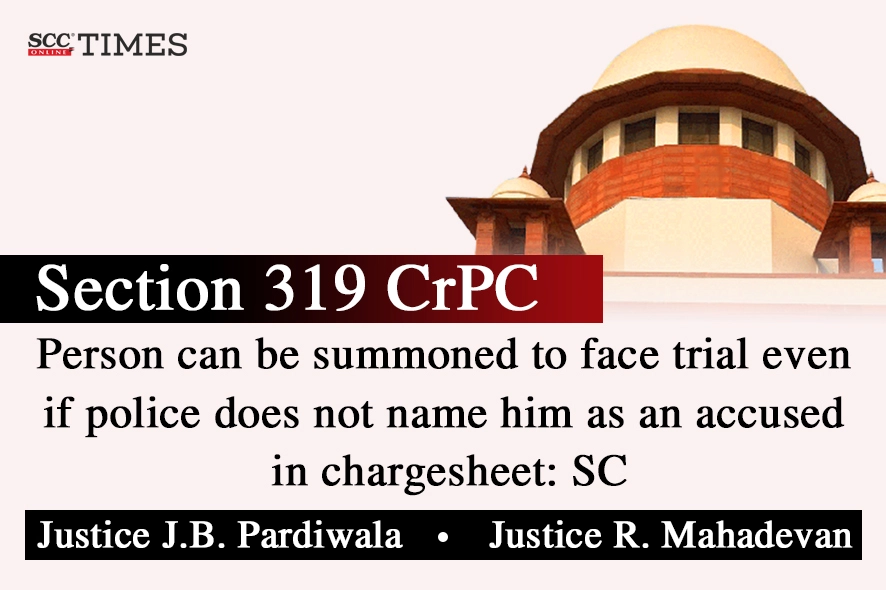Supreme Court: In a criminal petition against the Madhya Pradesh High Court’s decision, rejecting the criminal revision application and affirming the Trial Court’s decision summoning the accused persons herein to face trial for murder, the Division Bench of JB Pardiwala and R. Mahadevan, JJ., dismissed the petition and upheld the High Court’s decision.
The Court held that the Trial Court has undoubted jurisdiction to add any person not being the accused before it to face the trial along with other accused persons, if the Court is satisfied at any stage of the proceedings on the evidence adduced that the persons who have not been arrayed as accused should face the trial.
Factual Matrix
The First Information Report (‘FIR’) was registered for the offence punishable under Sections 302, 307, 147, 148 and 149 of the Penal Code, 1860 (‘IPC’) against seven individuals, including the two accused persons herein. In the FIR, it was alleged that on 20-02-2018, after hearing, the accused persons surrounded the victims and shot at them with a pistol which hit the deceased in his head and stomach.
The accused persons being dissatisfied with the order passed by the Trial Court summoning them to face the trial preferred revision application before the High Court. The High Court rejected the revision application and thereby affirmed the order passed by the Trial Court summoning the petitioners in exercise of its powers under Section 319 of the Code of Criminal Procedure, 1973 (‘CrPC’).
Decision
The Court perused the informant’s examination-in-chief, wherein he reiterated what was narrated in the FIR, and said that he categorically deposed against the two accused persons herein and also attributed a specific overt act.
For exercising power under Section 319 of the CrPC, the Court noted that in Hardeep Singh v. State of Punjab, (2014) 3 SCC 92, it was laid down that- power under Section 319 of the CrPC is a discretionary and an extraordinary power. It is to be exercised sparingly and only in those cases where the circumstances of the case so warrant. It is not to be exercised because the Magistrate or the Sessions Judge is of the opinion that some other person may also be guilty of committing that offence. Only where strong and cogent evidence occurs against a person from the evidence led before the court that such power should be exercised and not in a casual and cavalier manner. Thus, though only a prima facie case is to be established from the evidence led before the court, not necessarily tested on the anvil of cross-examination, it requires much stronger evidence than mere probability of his complicity. The test that has to be applied is one which is more than prima facie case as exercised at the time of framing of charge, but short of satisfaction to an extent that the evidence, if goes unrebutted, would lead to conviction.
The Court reiterated that for invoking the powers under Section 319 of the CrPC there should be strong and cogent evidence against a person from the evidence. The power cannot be exercised in a casual and cavalier manner.
Regarding the submission that the Trial Court before summoning the accused persons in exercise of its powers under Section 319 of the CrPC should have taken into consideration the closure report filed by the I.O. exonerating them from the alleged offence, the Court refused to agree with this contention stating that when a person is named in the FIR by the complainant but the police, after investigation finds no role of that particular person and files chargesheet without implicating him, the Court is not powerless and at the stage of summoning, if the Trial Court finds that a particular person should be summoned as accused, even though not named in the chargesheet, it can do so.
In this context, the Court relied on S. Mohammed Ispahani v. Yogendra Chandak, (2017) 16 SCC 226 wherein the Court observed that, if the trial court finds that a particular person should be summoned as accused, even though not named in the chargesheet, it can do so, and at this stage, chance is given to the complainant to file a protest petition urging upon the trial court to summon other persons as well who were named in the FIR but not implicated in the chargesheet. Once that stage has gone, the Court is still not powerless by virtue of Section 319 of the CrPC. However, this section gets triggered when during the trial some evidence surfaces against the proposed accused.
However, the Court noted the closure report filed by the police in the case on hand was yet to be looked into by the Trial Court but said that the closure report was now insignificant in view of the order passed by the Trial Court under Section 319 of the CrPC summoning the accused persons to force the trial. Though, the Court said that it would have been in fitness of things if the Court concerned would have looked into the closure report at the earliest and passed an appropriate order one way or the other after hearing the complainant. The Court stated that the Court should not keep the closure report pending for consideration for a long time and should be looked into promptly.
The Court reiterated the following principles of law around Section 319 of the CrPC:
-
The Trial Court has undoubted jurisdiction to add any person not being the accused before it to face the trial along with other accused persons, if the Court is satisfied at any stage of the proceedings on the evidence adduced that the persons who have not been arrayed as accused should face the trial. It is further evident that such person even though had initially been named in the FIR as an accused, but not charge sheeted, can also be added to face the trial.
-
The Trial Court can take such a step to add such persons as accused only on the basis of evidence adduced before it and not on the basis of materials available in the chargesheet or the case diary, because such materials contained in the chargesheet, or the case diary do not constitute evidence.
-
The power of the Court under Section 319 of the CrPC is not controlled or governed by naming or not naming of the person concerned in the FIR. Nor the same is dependent upon submission of the chargesheet by the police against the person concerned. The phrase ‘any person not being the accused’ occurred in Section 319 does not exclude from its operation an accused who has been released by the police under Section 169 of the Code. It covers any person who is not being tried already by the Court and the very purpose of enacting such a provision like Section 319(1) clearly shows that even persons who have been dropped by the police during investigation but against whom evidence showing their involvement in the offence comes before the Criminal Court are included in the said expression.
-
It would not be proper for the trial court to reject the application for addition of new accused by considering records of the Investigating Officer. When the evidence of complainant is found to be worthy of acceptance then the satisfaction of the Investigating Officer hardly matters. If satisfaction of Investigating Officer is to be treated as determinative, then the purpose of Section 319 would be frustrated.
CASE DETAILS
|
Citation: Appellants : Respondents : |
Advocates who appeared in this case For Petitioner(s): For Respondent(s): |
CORAM :










